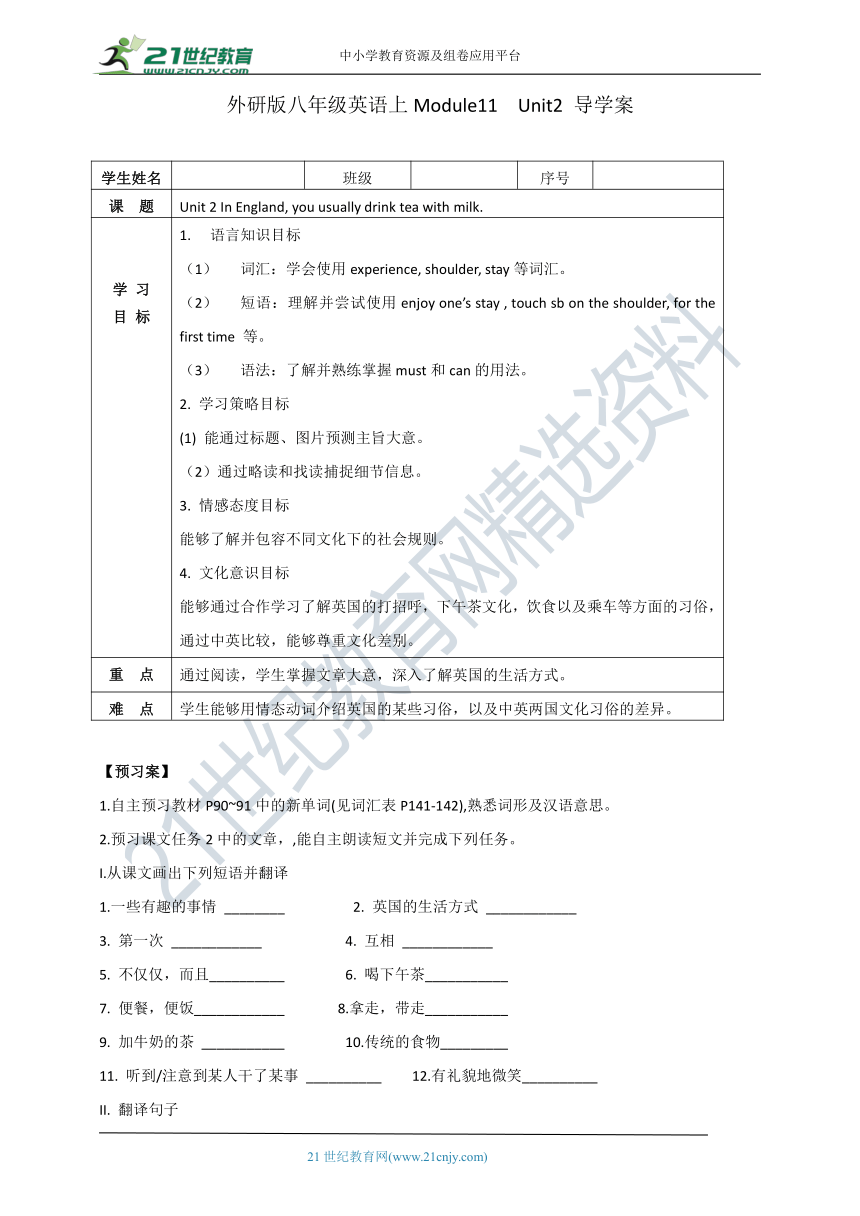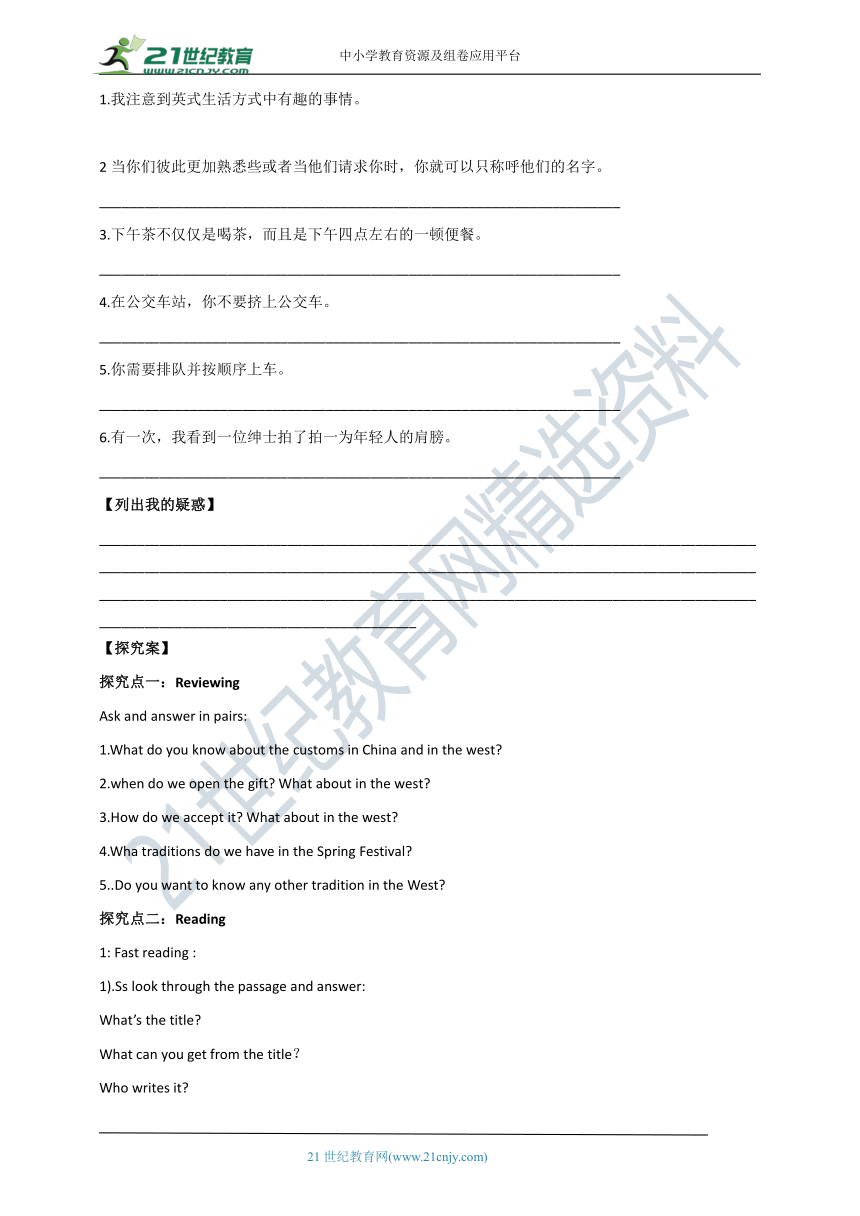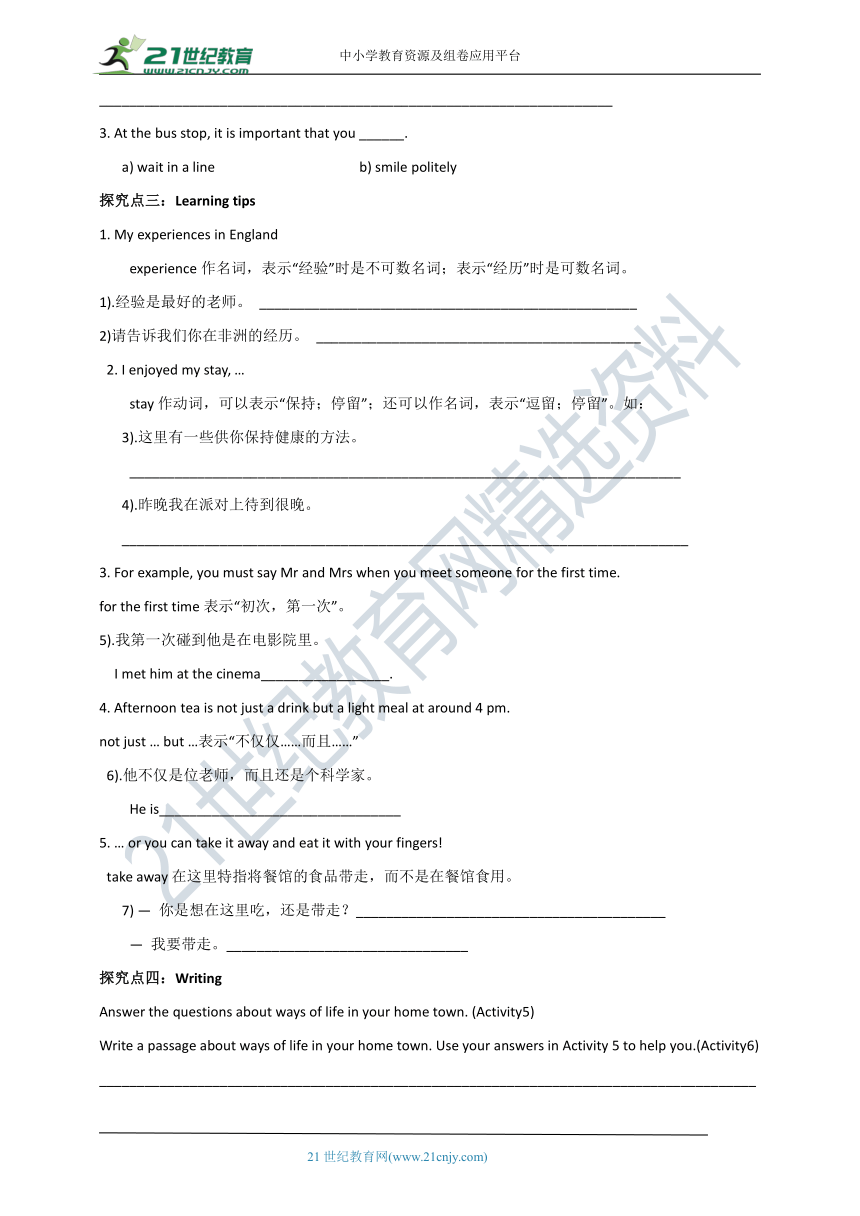Module11 Unit 2 In England, you usually drink tea with milk.导学案
文档属性
| 名称 | Module11 Unit 2 In England, you usually drink tea with milk.导学案 |  | |
| 格式 | doc | ||
| 文件大小 | 1.2MB | ||
| 资源类型 | 试卷 | ||
| 版本资源 | 外研版 | ||
| 科目 | 英语 | ||
| 更新时间 | 2020-12-08 09:46:45 | ||
图片预览




文档简介
中小学教育资源及组卷应用平台
外研版八年级英语上Module11 Unit2 导学案
学生姓名
班级
序号
课 题 Unit 2 In England, you usually drink tea with milk.
学 习
目 标
1. 语言知识目标
(1) 词汇:学会使用experience, shoulder, stay等词汇。
(2) 短语:理解并尝试使用enjoy one’s stay , touch sb on the shoulder, for the first time 等。
(3) 语法:了解并熟练掌握must和can的用法。
2. 学习策略目标
(1) 能通过标题、图片预测主旨大意。
(2)通过略读和找读捕捉细节信息。
3. 情感态度目标
能够了解并包容不同文化下的社会规则。
4. 文化意识目标
能够通过合作学习了解英国的打招呼,下午茶文化,饮食以及乘车等方面的习俗,通过中英比较,能够尊重文化差别。
重 点 通过阅读,学生掌握文章大意,深入了解英国的生活方式。
难 点 学生能够用情态动词介绍英国的某些习俗,以及中英两国文化习俗的差异。
【预习案】
1.自主预习教材P90~91中的新单词(见词汇表P141-142),熟悉词形及汉语意思。
2.预习课文任务2中的文章,,能自主朗读短文并完成下列任务。
I.从课文画出下列短语并翻译
1.一些有趣的事情 ________ 2. 英国的生活方式 ____________
3. 第一次 ____________ 4. 互相 ____________
5. 不仅仅,而且__________ 6. 喝下午茶___________
7. 便餐,便饭____________ 8.拿走,带走___________
9. 加牛奶的茶 ___________ 10.传统的食物_________
11. 听到/注意到某人干了某事 __________ 12.有礼貌地微笑__________
II. 翻译句子
1.我注意到英式生活方式中有趣的事情。
2当你们彼此更加熟悉些或者当他们请求你时,你就可以只称呼他们的名字。
_____________________________________________________________________
3.下午茶不仅仅是喝茶,而且是下午四点左右的一顿便餐。
_____________________________________________________________________
4.在公交车站,你不要挤上公交车。
_____________________________________________________________________
5.你需要排队并按顺序上车。
_____________________________________________________________________
6.有一次,我看到一位绅士拍了拍一为年轻人的肩膀。
_____________________________________________________________________
【列出我的疑惑】
_______________________________________________________________________________________________________________________________________________________________________________________________________________________________________________________________________________________________________________
【探究案】
探究点一:Reviewing
Ask and answer in pairs:
1.What do you know about the customs in China and in the west?
2.when do we open the gift? What about in the west?
3.How do we accept it? What about in the west?
4.Wha traditions do we have in the Spring Festival?
5..Do you want to know any other tradition in the West?
探究点二:Reading
1: Fast reading :
1).Ss look through the passage and answer:
What’s the title?
What can you get from the title?
Who writes it?
How many paragraphs are there?
2).Match the main idea with each paragraph.
Para.1 Eating traditional food
Para. 2 Enjoying stay in England
Para. 3 Calling someone
Para. 4 Waiting for a bus
Para. 5 Having afternoon tea
II:Careful reading
1).Read para.1 and check the true sentences.
(1).Wang Hui went to England this year. ( )
(2).Wang Hui liked his stay in England. ( )
(3). He noticed some differences in the way of life between China and England. ( )
2).Read para.2 and answer.
1. When must you say Mr or Mrs ?
__________________________________________________________________
2. When can you just use their first names?
___________________________________________________________________
3).Read para.3 and fill in the blanks
In England, people have afternoon tea at ________ 4 pm. Afternoon tea is ________ a drink _____ a light meal. They eat ___________ and a large fruit cake. They usually drink tea _____ milk.
Q:Is afternoon tea just a drink or a light meal?
___________________________________________________________________
4).Read para.4 and answer
(1). What is it?______________________________________________________
(2). Where to buy it?____________________________________________________
(3). How to eat it? _________________________________________________________
5).Read para.5 and answer
1.What do people do when they wait for the bus?
_______________________________________________________________________
2.What can you do if someone in front of you is slow to get on the bus at the bus stop?
____________________________________________________________________
3. At the bus stop, it is important that you ______.
a) wait in a line b) smile politely
探究点三:Learning tips
1. My experiences in England
experience作名词,表示“经验”时是不可数名词;表示“经历”时是可数名词。
1).经验是最好的老师。 __________________________________________________
2)请告诉我们你在非洲的经历。 ___________________________________________
2. I enjoyed my stay, …
stay作动词,可以表示“保持;停留”;还可以作名词,表示“逗留;停留”。如:
3).这里有一些供你保持健康的方法。
_________________________________________________________________________
4).昨晚我在派对上待到很晚。
___________________________________________________________________________
3. For example, you must say Mr and Mrs when you meet someone for the first time.
for the first time表示“初次,第一次”。
5).我第一次碰到他是在电影院里。
I met him at the cinema_________________.
4. Afternoon tea is not just a drink but a light meal at around 4 pm.
not just … but …表示“不仅仅……而且……”
6).他不仅是位老师,而且还是个科学家。
He is________________________________
5. … or you can take it away and eat it with your fingers!
take away在这里特指将餐馆的食品带走,而不是在餐馆食用。
7) — 你是想在这里吃,还是带走?_________________________________________
— 我要带走。________________________________
探究点四:Writing
Answer the questions about ways of life in your home town. (Activity5)
Write a passage about ways of life in your home town. Use your answers in Activity 5 to help you.(Activity6)
_________________________________________________________________________________________________________________________________________________________________________________________________________________________________________________________________________________________________________________________________________________________________________________________________________________________________________________________________________________________________________________________________________________________________________________________________________________________________
【我的知识网络图】
【训练案】
Ⅰ.用方框中所给短语的适当形式填空
1.I don’t know in newspapers because I don’t like reading them.?
2.We and had a happy talk on our seats.?
3.Your shoes are dirty. Please them .?
4.We should when waiting for our turn.?
5.I fell in love with the city when I came here .?
Ⅱ.单项选择
( )1.At a tea party in England, people usually drink tea milk?
A.has B. have C. with D. without
( )2.To make our school more beautiful, you throw paper everywhere.?
A .needn’t B. mustn’t C .must D .may
( )3.—Must I finish my homework this evening?
— No, you .You do it tomorrow.?
A.needn’t; may B. may; may C.can’t; may D. mustn’t; can
( )4.People eat the fish and chips their fingers in England.?
on B. for C. with D. about
( )5.“Whose T-shirt is this?”“It be John’s.It’s much too small for him.”?
A.might B. can’t C .needn’ t
Ⅲ.翻译句子
1.我喜欢逛街时喝奶茶。
I like drinking when shopping.?
2.老年人上公共汽车很慢。
The old are slow the bus.?
3.你们应该互相帮助。
You should help .?
4.你不应该碰我的肩膀。
You shouldn’t me .?
5.你在火车站排队是很重要的。
It is important for you at the railway station.?
IV:阅读表达。
People enjoy different indoor and outdoor activities in Britain. A recent European survey (调查) discovered that people in Britain spend about 45% of their free time watching television, 24% of their free time doing social (社会的) activities, 22-23% on sports and hobbies, and 10% on other activities. Other popular activities are listening to the radio, listening to music, reading, gardening, eating out and going to the cinema.
Television
The most common activity in the UK is watching television. People often spend 25 hours every week on TV. Almost every household (家庭) has at least one television set at home. In 1999, 13% of households had satellite television and 9% cable television.
Radio
People in Britain listen to about 15 hours and 50 minutes of radio every week.
Entertaining (娱乐)
Another popular activity in Britain is visiting or entertaining friends.
Cinema
About 123 million British people went to the cinema in 1998. It is the most popular cultural (文化的) activity in the UK.
Eating Out
越来越多的英国人喜欢在外面吃饭。 In 1999 every British person spent $5.63 every week on food outside.
1.What do people enjoy in Britain?
_____________________________________________________________________________
2.把文中划线句子翻译成汉语。
_____________________________________________________________________________
3.把文中划线句子翻译成英语。
_____________________________________________________________________________
4.找出同义句。It often takes people 25 hours to watch TV every week.
_____________________________________________________________________________
5. 文中It指代内容是什么?
____________________________________________________________________________
【预习案参考答案】
I.1.something interesting. 2.the English way of life. 3.for the first time. 4.each other. 5.not just… but. 6.have afternoon tea. 7.a light meal. 8.take away. 9.tea with milk. 10.traditional food. 11.notice sb do sth. 12.smile politely.
II.1.I noticed something interesting with the English way of life.
2.When you get to know each other better or when they ask you to. You can just use their first names. 3.Afternoon tea is not just a drink but a light meal at around four p.m.
4. At the bus stop, you must not push your way onto the bus.
5.You need to stand in a line and wait your turn.
6.Once I noticed a gentleman touch a young man on the shoulder.
【探究案答案】
1).Experience is the best teacher.
2).Please tell us your experiences in?Africa.
3).Here are some ways for you to stay healthy.
4).I stayed late at the party last night.
5).for the first time
6).not just a teacher but an scientist.
7).— Would you eat it here or take it away?
— I’ll take it away.
【达标案参考答案】
Ⅰ.1.anything interesting 2.got on the bus 3.take;away 4.stand in a line 5.for the first time
Ⅱ.1—5 CBACB
Ⅲ.1.tea with milk 2.to get on 3.each other 4.touch;on the shoulder 5.to stand in a line
IV.1. People enjoy different indoor and outdoor activities in Britain.
2.在英国,最普遍的活动是看电视。
3.More and more people in Britain like eating out.
4. People often spend 25 hours every week on TV.
5.Watching movies.
【教与学的反思】
___________________________________________________________________________________________________________________________________________________________________________________________________________________________________________________________________
_21?????????è?????(www.21cnjy.com)_
外研版八年级英语上Module11 Unit2 导学案
学生姓名
班级
序号
课 题 Unit 2 In England, you usually drink tea with milk.
学 习
目 标
1. 语言知识目标
(1) 词汇:学会使用experience, shoulder, stay等词汇。
(2) 短语:理解并尝试使用enjoy one’s stay , touch sb on the shoulder, for the first time 等。
(3) 语法:了解并熟练掌握must和can的用法。
2. 学习策略目标
(1) 能通过标题、图片预测主旨大意。
(2)通过略读和找读捕捉细节信息。
3. 情感态度目标
能够了解并包容不同文化下的社会规则。
4. 文化意识目标
能够通过合作学习了解英国的打招呼,下午茶文化,饮食以及乘车等方面的习俗,通过中英比较,能够尊重文化差别。
重 点 通过阅读,学生掌握文章大意,深入了解英国的生活方式。
难 点 学生能够用情态动词介绍英国的某些习俗,以及中英两国文化习俗的差异。
【预习案】
1.自主预习教材P90~91中的新单词(见词汇表P141-142),熟悉词形及汉语意思。
2.预习课文任务2中的文章,,能自主朗读短文并完成下列任务。
I.从课文画出下列短语并翻译
1.一些有趣的事情 ________ 2. 英国的生活方式 ____________
3. 第一次 ____________ 4. 互相 ____________
5. 不仅仅,而且__________ 6. 喝下午茶___________
7. 便餐,便饭____________ 8.拿走,带走___________
9. 加牛奶的茶 ___________ 10.传统的食物_________
11. 听到/注意到某人干了某事 __________ 12.有礼貌地微笑__________
II. 翻译句子
1.我注意到英式生活方式中有趣的事情。
2当你们彼此更加熟悉些或者当他们请求你时,你就可以只称呼他们的名字。
_____________________________________________________________________
3.下午茶不仅仅是喝茶,而且是下午四点左右的一顿便餐。
_____________________________________________________________________
4.在公交车站,你不要挤上公交车。
_____________________________________________________________________
5.你需要排队并按顺序上车。
_____________________________________________________________________
6.有一次,我看到一位绅士拍了拍一为年轻人的肩膀。
_____________________________________________________________________
【列出我的疑惑】
_______________________________________________________________________________________________________________________________________________________________________________________________________________________________________________________________________________________________________________
【探究案】
探究点一:Reviewing
Ask and answer in pairs:
1.What do you know about the customs in China and in the west?
2.when do we open the gift? What about in the west?
3.How do we accept it? What about in the west?
4.Wha traditions do we have in the Spring Festival?
5..Do you want to know any other tradition in the West?
探究点二:Reading
1: Fast reading :
1).Ss look through the passage and answer:
What’s the title?
What can you get from the title?
Who writes it?
How many paragraphs are there?
2).Match the main idea with each paragraph.
Para.1 Eating traditional food
Para. 2 Enjoying stay in England
Para. 3 Calling someone
Para. 4 Waiting for a bus
Para. 5 Having afternoon tea
II:Careful reading
1).Read para.1 and check the true sentences.
(1).Wang Hui went to England this year. ( )
(2).Wang Hui liked his stay in England. ( )
(3). He noticed some differences in the way of life between China and England. ( )
2).Read para.2 and answer.
1. When must you say Mr or Mrs ?
__________________________________________________________________
2. When can you just use their first names?
___________________________________________________________________
3).Read para.3 and fill in the blanks
In England, people have afternoon tea at ________ 4 pm. Afternoon tea is ________ a drink _____ a light meal. They eat ___________ and a large fruit cake. They usually drink tea _____ milk.
Q:Is afternoon tea just a drink or a light meal?
___________________________________________________________________
4).Read para.4 and answer
(1). What is it?______________________________________________________
(2). Where to buy it?____________________________________________________
(3). How to eat it? _________________________________________________________
5).Read para.5 and answer
1.What do people do when they wait for the bus?
_______________________________________________________________________
2.What can you do if someone in front of you is slow to get on the bus at the bus stop?
____________________________________________________________________
3. At the bus stop, it is important that you ______.
a) wait in a line b) smile politely
探究点三:Learning tips
1. My experiences in England
experience作名词,表示“经验”时是不可数名词;表示“经历”时是可数名词。
1).经验是最好的老师。 __________________________________________________
2)请告诉我们你在非洲的经历。 ___________________________________________
2. I enjoyed my stay, …
stay作动词,可以表示“保持;停留”;还可以作名词,表示“逗留;停留”。如:
3).这里有一些供你保持健康的方法。
_________________________________________________________________________
4).昨晚我在派对上待到很晚。
___________________________________________________________________________
3. For example, you must say Mr and Mrs when you meet someone for the first time.
for the first time表示“初次,第一次”。
5).我第一次碰到他是在电影院里。
I met him at the cinema_________________.
4. Afternoon tea is not just a drink but a light meal at around 4 pm.
not just … but …表示“不仅仅……而且……”
6).他不仅是位老师,而且还是个科学家。
He is________________________________
5. … or you can take it away and eat it with your fingers!
take away在这里特指将餐馆的食品带走,而不是在餐馆食用。
7) — 你是想在这里吃,还是带走?_________________________________________
— 我要带走。________________________________
探究点四:Writing
Answer the questions about ways of life in your home town. (Activity5)
Write a passage about ways of life in your home town. Use your answers in Activity 5 to help you.(Activity6)
_________________________________________________________________________________________________________________________________________________________________________________________________________________________________________________________________________________________________________________________________________________________________________________________________________________________________________________________________________________________________________________________________________________________________________________________________________________________________
【我的知识网络图】
【训练案】
Ⅰ.用方框中所给短语的适当形式填空
1.I don’t know in newspapers because I don’t like reading them.?
2.We and had a happy talk on our seats.?
3.Your shoes are dirty. Please them .?
4.We should when waiting for our turn.?
5.I fell in love with the city when I came here .?
Ⅱ.单项选择
( )1.At a tea party in England, people usually drink tea milk?
A.has B. have C. with D. without
( )2.To make our school more beautiful, you throw paper everywhere.?
A .needn’t B. mustn’t C .must D .may
( )3.—Must I finish my homework this evening?
— No, you .You do it tomorrow.?
A.needn’t; may B. may; may C.can’t; may D. mustn’t; can
( )4.People eat the fish and chips their fingers in England.?
on B. for C. with D. about
( )5.“Whose T-shirt is this?”“It be John’s.It’s much too small for him.”?
A.might B. can’t C .needn’ t
Ⅲ.翻译句子
1.我喜欢逛街时喝奶茶。
I like drinking when shopping.?
2.老年人上公共汽车很慢。
The old are slow the bus.?
3.你们应该互相帮助。
You should help .?
4.你不应该碰我的肩膀。
You shouldn’t me .?
5.你在火车站排队是很重要的。
It is important for you at the railway station.?
IV:阅读表达。
People enjoy different indoor and outdoor activities in Britain. A recent European survey (调查) discovered that people in Britain spend about 45% of their free time watching television, 24% of their free time doing social (社会的) activities, 22-23% on sports and hobbies, and 10% on other activities. Other popular activities are listening to the radio, listening to music, reading, gardening, eating out and going to the cinema.
Television
The most common activity in the UK is watching television. People often spend 25 hours every week on TV. Almost every household (家庭) has at least one television set at home. In 1999, 13% of households had satellite television and 9% cable television.
Radio
People in Britain listen to about 15 hours and 50 minutes of radio every week.
Entertaining (娱乐)
Another popular activity in Britain is visiting or entertaining friends.
Cinema
About 123 million British people went to the cinema in 1998. It is the most popular cultural (文化的) activity in the UK.
Eating Out
越来越多的英国人喜欢在外面吃饭。 In 1999 every British person spent $5.63 every week on food outside.
1.What do people enjoy in Britain?
_____________________________________________________________________________
2.把文中划线句子翻译成汉语。
_____________________________________________________________________________
3.把文中划线句子翻译成英语。
_____________________________________________________________________________
4.找出同义句。It often takes people 25 hours to watch TV every week.
_____________________________________________________________________________
5. 文中It指代内容是什么?
____________________________________________________________________________
【预习案参考答案】
I.1.something interesting. 2.the English way of life. 3.for the first time. 4.each other. 5.not just… but. 6.have afternoon tea. 7.a light meal. 8.take away. 9.tea with milk. 10.traditional food. 11.notice sb do sth. 12.smile politely.
II.1.I noticed something interesting with the English way of life.
2.When you get to know each other better or when they ask you to. You can just use their first names. 3.Afternoon tea is not just a drink but a light meal at around four p.m.
4. At the bus stop, you must not push your way onto the bus.
5.You need to stand in a line and wait your turn.
6.Once I noticed a gentleman touch a young man on the shoulder.
【探究案答案】
1).Experience is the best teacher.
2).Please tell us your experiences in?Africa.
3).Here are some ways for you to stay healthy.
4).I stayed late at the party last night.
5).for the first time
6).not just a teacher but an scientist.
7).— Would you eat it here or take it away?
— I’ll take it away.
【达标案参考答案】
Ⅰ.1.anything interesting 2.got on the bus 3.take;away 4.stand in a line 5.for the first time
Ⅱ.1—5 CBACB
Ⅲ.1.tea with milk 2.to get on 3.each other 4.touch;on the shoulder 5.to stand in a line
IV.1. People enjoy different indoor and outdoor activities in Britain.
2.在英国,最普遍的活动是看电视。
3.More and more people in Britain like eating out.
4. People often spend 25 hours every week on TV.
5.Watching movies.
【教与学的反思】
___________________________________________________________________________________________________________________________________________________________________________________________________________________________________________________________________
_21?????????è?????(www.21cnjy.com)_
同课章节目录
- Module 1 How to learn English
- Unit 1 Let's try to speak English as much as possi
- Unit 2 You should smile at her.
- Unit 3 Language in use .
- Module 2 My home town and my country
- Unit 1 It's taller than many other buildings.
- Unit 2 Cambridge is a beautiful city in the east o
- Unit 3 Language in use .
- Module 3 Sports.
- Unit 1 Nothing is more exciting than playing tenni
- Unit 2 This year we training more carefully.
- Unit 3 Language in use .
- Module 4 Planes, ships and trains .
- Unit 1 He lives the farthest from school.
- Unit 2 What is the best way to travel.
- Unit 3 Language in use .
- Module 5 Lao She Teahouse.
- Unit 1 I wanted to see the Beijing Opera.
- Unit 2 It descibes the changes in Chinese society.
- Unit 3 Language in use .
- Module 6 Animals in danger.
- Unit 1 It allows people to get closer to them .
- Unit 2 The WWF is working hard to save them all.
- Unit 3 Language in use .
- Revision module A
- Module 7 A famous story
- Unit 1 Alice was sitting with her sister by the ri
- Unit 2 She was thinking about her cat.
- Unit 3 Language in use .
- Module 8 Accidents
- Unit 1 While the car were changing to red, a car s
- Unit 2 I was trying to pick it up when it bite me
- Unit 3 Language in use .
- Module 9 Population
- Unit 1 The population of China is about 1.37 billi
- Unit 2 Arnwick was a city with 200,000 people.
- Unit 3 Language in use .
- Module 10 The weathe
- Unit 1 It might snow.
- Unit 2 The weather is fine all year round.
- Unit 3 Language in use .
- Module 11 Way of life
- Unit 1 In China ,we open a gift later.
- Unit 2 In England, you usually drink tea with milk
- Unit 3 Language in use .
- Module 12 Help
- Unit 1 What should we do before help arrives?
- Unit 2 Stay away from windows and heavy furniture.
- Unit 3 Language in use .
- Revision module B
